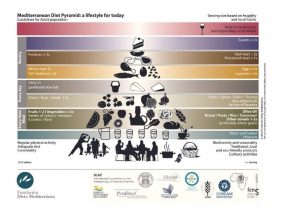The health benefits of a Mediterranean diet are well known. But did you know, eating plenty of fruit and vegetables and cutting back on red meat can counter erectile dysfunction, and help you lose weight as well as helping with many other medical conditions?
The combination of olive oil, legumes, fruit and vegetables, and comparatively low amounts of red meat is incredibly good for the human body. UNESCO has even listed the Mediterranean diet in Spain as one of a Representative List of the Intangible Cultural Heritage of Humanity
What are the health benefits?
Studies have shown this diet has numerous benefits and is claimed it may help the following conditions;
- Erectile dysfunction
- Inflammation
- Cardiovascular health
- Weight loss and maintenance
- Depression
- Reduce heart attack or stroke risk
- Type 2 diabetes
- Cognitive Decline and Alzheimer’s Disease
- Rheumatoid Arthritis
- Cancer
According to research presented at a European Society of Cardiology congress, men with high blood pressure are twice as likely to experience erectile dysfunction than those with normal blood pressure. The Mediterranean diet is perfect for lowering blood pressure.
Researchers also found that men who stuck closely to the Mediterranean diet had higher coronary flow reserve (which means they were better able to increase blood flow when needed to the parts that needed it), and better erectile performance. Erectile dysfunction is thought to affect around a third of men at some point.
The Mediterranean Diet Foundation among other things, recommends a daily intake of 1.5-2 litres of water and red meat within moderation. Fresh fruit and dairy products should be consumed daily.

What exactly is the Mediterranean diet?
The Mediterranean diet focuses on whole grains, good fats (fish, olive oil, nuts, etc.), vegetables, fruits, fish, and low consumption of red meat. However, the Mediterranean diet is not just about food. There is also an emphasis on the need to spend time eating together with family and physical activity.
Olive oil is the main fat source in Mediterranean cuisine. It is rich in Vitamin E, beta-carotene. This is a type of vegetal fat (monounsaturated) that helps prevent cardiovascular diseases.
At least 5 pieces of fruit and vegetables should be consumed each day as they contain essential vitamins and minerals. And thanks to the elevated content of antioxidants and fibre, they can contribute to preventing various cardiovascular diseases and certain cancers, among others.
Daily consumption of pasta, rice, and whole-grain products, in general, is essential due to their high content of carbohydrates. They help with energy and activity.
Furthermore, locally produced foods with minimum processing contain the best nutrients and lessen the environmental impact.
Lastly, fish, especially “fatty” fish are an essential part of the Mediterranean diet.


